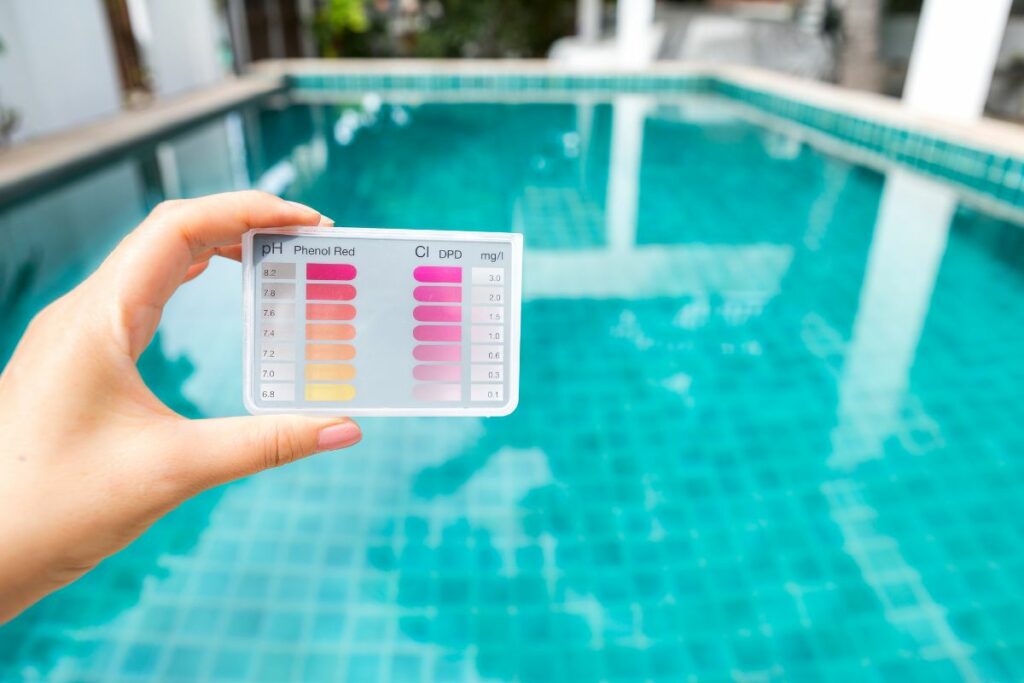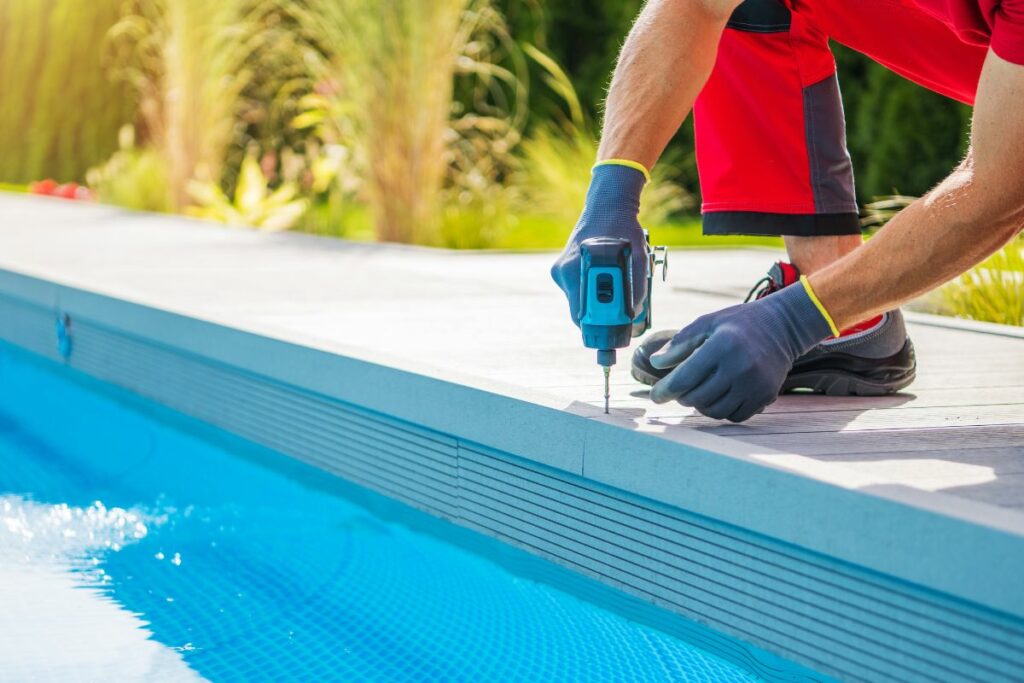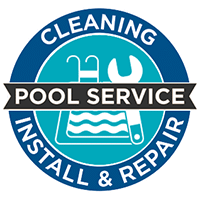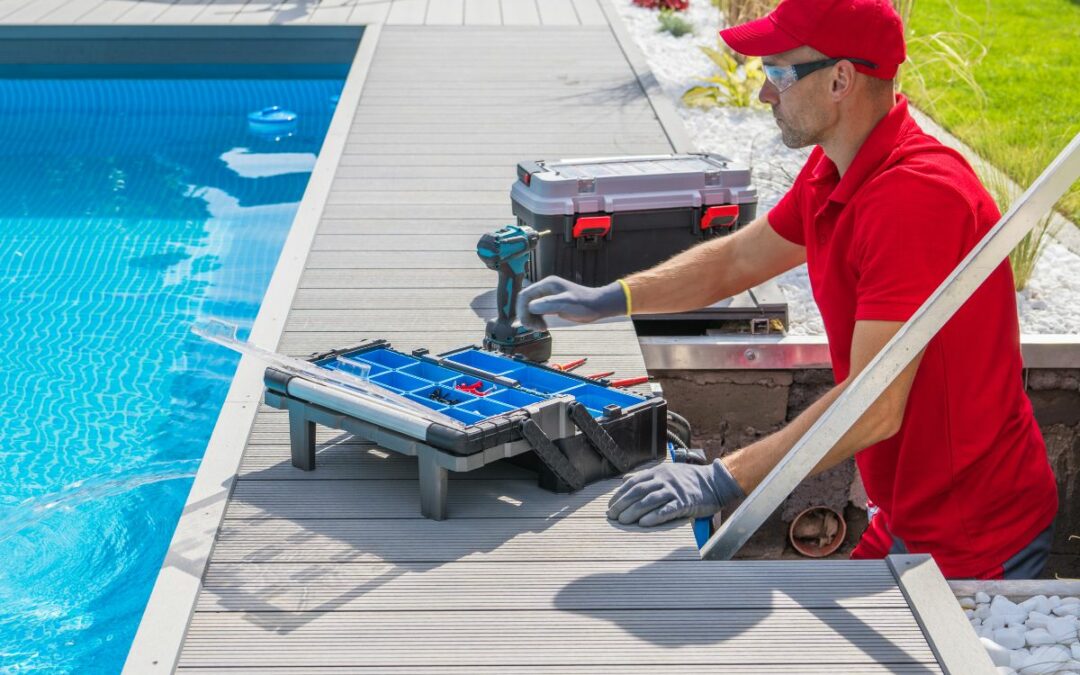Keeping your pool in top condition is crucial for enjoying a safe and refreshing swim during the summer months. Seasonal pool maintenance, especially in spring, plays a vital role in ensuring that your pool is clean, safe, and ready for use. In this guide, we’ll dive into essential care tips and tricks specifically tailored for spring maintenance to prepare your pool for the upcoming summer season.
Learn The Benefits of Seasonal Pool Maintenance
Why Do Seasonal Pool Maintenance
Seasonal pool maintenance is a critical aspect of owning a pool, offering numerous benefits that contribute to your overall enjoyment, safety, and cost-effectiveness. Let’s delve into why seasonal pool maintenance is so important:
Water Quality Enhancement
Regular maintenance plays a key role in ensuring optimal water quality in your pool. This includes balancing chemical levels such as pH and chlorine, which are crucial for disinfection and algae control.
By regularly testing and adjusting these levels, you create a clean and hygienic swimming environment. Removing debris through skimming and cleaning the pool walls and floors also contributes to water clarity and purity, making your pool more inviting and enjoyable for swimming.
Equipment Preservation and Efficiency
Seasonal maintenance is vital for preserving the lifespan and efficiency of your pool equipment. Filters, pumps, heaters, and other components require regular inspection and cleaning to prevent clogs, leaks, or malfunctions.
By addressing minor issues early on and performing routine maintenance tasks, you can avoid costly repairs or premature replacements of equipment. This not only saves you money in the long run but also ensures that your pool operates smoothly and efficiently throughout the season.
Safety and Risk Reduction
Maintaining safety features and conducting regular inspections are essential aspects of seasonal pool maintenance. Safety measures such as pool covers, fences, and alarms help prevent accidents and protect children and pets from entering the pool unsupervised.
Additionally, thorough inspections of pool structures and equipment help identify potential hazards or defects that could pose safety risks. By prioritizing safety in your maintenance routine, you create a secure environment for everyone using the pool.
Cost-Effective Practices
Investing time and effort in seasonal pool maintenance ultimately leads to cost savings. By proactively addressing maintenance tasks, you can avoid major repairs or replacements that can be expensive.
Efficient equipment operation and balanced chemical levels also contribute to lower energy and water consumption, reducing your overall maintenance and utility costs. Incorporating cost-effective practices into your maintenance routine helps you maximize the value and longevity of your pool investment.
Enhanced Enjoyment and Relaxation
Perhaps the most rewarding aspect of seasonal pool maintenance is the enhanced enjoyment and relaxation it provides. A well-maintained pool with clear water, comfortable temperature, and efficient equipment creates an inviting space for swimming, lounging, and socializing. Whether you’re hosting pool parties, exercising, or simply unwinding after a long day, a properly maintained pool enhances your overall experience and allows you to fully enjoy your outdoor oasis.
Seasonal pool maintenance is not just a chore but a proactive investment in your pool’s health, safety, and longevity. By prioritizing water quality, equipment efficiency, safety measures, cost-effective practices, and overall enjoyment, you can create a stunning and functional pool environment that brings joy and relaxation to your life.
How to Do Seasonal Pool Maintenance

Implementing a thorough seasonal pool maintenance routine is essential to maintain your pool’s pristine condition throughout the seasons. This involves a series of tasks aimed at ensuring water quality, equipment efficiency, and overall safety. Let’s explore how you can effectively carry out seasonal pool maintenance to keep your pool clean, safe, and enjoyable for swimming.
Cleaning and Skimming
Skimming the surface of your pool regularly is essential to remove leaves, insects, and other debris that can accumulate over time. Use a skimmer net to skim the water surface, focusing on areas where debris tends to gather, such as near trees or shrubs.
In addition to skimming, it’s important to clean the walls and floors of your pool to maintain water clarity and hygiene. Use pool brushes to scrub the walls and remove algae or dirt buildup. For the pool floor, a vacuum cleaner designed for pools can effectively remove debris and sediment, keeping your pool clean and inviting for swimming. Regular cleaning and skimming not only improve the appearance of your pool but also contribute to its overall health and longevity.
Checking and Balancing Chemical Levels
Regularly testing and balancing the chemical levels in your pool is crucial for maintaining water quality and ensuring a safe swimming environment. Here are the key steps to follow:
- Testing pH and Chlorine Levels: Use a pool water testing kit to check your pool’s pH and chlorine levels. The ideal pH level should be between 7.4 and 7.6, while the chlorine level should be between 1 and 3 parts per million (ppm).
- Adjusting Chemicals: Based on the test results, adjust the pH and chlorine levels as needed. Use a pH increaser or decreaser to bring the pH into the optimal range. Add chlorine or shock treatment to maintain proper disinfection and algae control.
- Additional Considerations: Remember to test and balance other chemicals, such as alkalinity, calcium hardness, and cyanuric acid. Follow manufacturer instructions and safety guidelines when handling pool chemicals.
Inspecting and Maintaining Equipment
Regular inspection and maintenance of your pool equipment are essential for optimal performance and longevity. Here’s what you should do:
- Inspect Filters: Regularly check your pool’s filters for debris buildup and clogs. Clean or replace filters as needed to ensure efficient filtration and water circulation.
- Check Pumps: Inspect the pump for any signs of leaks, unusual noises, or reduced water flow. Clean the pump basket and impeller regularly to prevent blockages and ensure proper operation.
- Maintain Heaters: If your pool has a heater, inspect it for issues such as leaks or corrosion. Clean the heater coils or burners to maintain efficient heating and extend lifespan.
- Basic Maintenance Tasks: In addition to specific equipment checks, basic maintenance tasks such as lubricating moving parts, tightening loose connections, and checking electrical components for safety are performed.
Inspecting and Repairing Pool Structures

Regularly inspecting and repairing pool structures is important for maintaining a safe and functional swimming environment. Here are some ways you can check your pool structures:
- Inspecting Tiles: Check for loose or cracked tiles around the pool perimeter. Replace damaged tiles to prevent injuries and water leakage.
- Examining Liners: Inspect pool liners for tears, wrinkles, or leaks. Patch any small damages and consider replacing extensively worn or damaged liners.
- Checking Diving Boards: Ensure diving boards are securely attached and free from cracks or signs of wear. Replace or repair diving boards as needed to prevent accidents.
Addressing Water Circulation and Filtration
Water circulation and filtration are vital aspects of maintaining a clean and healthy pool environment. Proper water circulation helps distribute chemicals evenly, prevents stagnation, and reduces the risk of algae growth and bacterial buildup. Effective filtration removes debris, dirt, and contaminants from the water, ensuring clarity and hygiene for swimming.
Tips for Optimizing Water Circulation and Maintaining Filters:
- Run your pool pump for an adequate duration each day to ensure thorough water circulation.
- Clean skimmer baskets and pump strainers regularly to prevent clogs and maintain optimal pump performance.
- Backwash or clean your pool filter according to manufacturer guidelines to ensure efficient filtration.
- If your current filter is struggling to keep up with filtration demands, consider upgrading to a more efficient or larger one.
- Pool covers should be used when the pool is not in use to minimize debris and reduce evaporation, which can help maintain water quality and circulation.
Safety Measures and Pool Cover
Seasonal pool maintenance includes inspecting and maintaining safety features such as perimeter fences, gate alarms, and pool covers. A secure fence and functioning alarms help prevent unauthorized access to the pool area and alert you to potential hazards, reducing the risk of accidents, especially involving young children or pets.
Here are essential safety measures and the benefits of using a pool cover during the off-season:
Installing Fences and Alarms for Safety:
- Install a fence around your pool with self-closing and self-latching gates to prevent unauthorized access, especially by young children.
- Consider adding alarms to gates and doors leading to the pool area to alert you if someone enters unsupervised.
Benefits of Using a Pool Cover during the Off-Season:
- Reduces Evaporation: A pool cover helps reduce water evaporation, which can lead to water conservation and lower refilling costs.
- Minimizes Debris: Covering your pool prevents leaves, dirt, and other debris from entering, reducing the need for frequent cleaning and maintenance.
- Safety Barrier: A sturdy pool cover acts as a safety barrier, especially for children and pets, preventing accidental falls into the pool.
- Maintains Water Quality: By keeping the pool covered, you can maintain water quality by reducing sunlight exposure, which can lead to algae growth and chemical breakdown.
- Energy Efficiency: Pool covers can help retain heat, reducing energy consumption for heating the pool water during cooler seasons.
Keep Your Pool Pristine with Professional Pool Contractors
Seasonal pool maintenance is essential for a safe and enjoyable swimming experience. Implementing these tips ensures a clean pool, equipment efficiency, and safety for all users.
Need help with seasonal pool maintenance? Look no further than Clear Water Pools, your trusted custom swimming pool builders serving Metro Atlanta.
Why choose us? With Clear Water Pools, you’re not just getting a pool; you’re getting an ultimate entertainment destination right in your backyard. Our team of top Atlanta swimming pool contractors is dedicated to delivering exceptional craftsmanship and personalized designs that reflect your style and preferences.
Don’t wait any longer to enhance your outdoor space! Contact us today at 770-406-8638 or request a pool estimate for your next project. Let us help you create the backyard oasis of your dreams!



